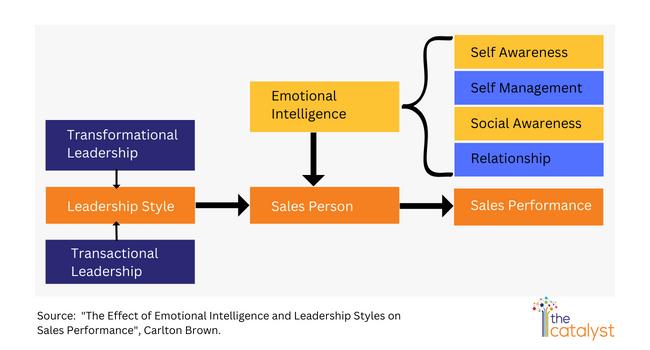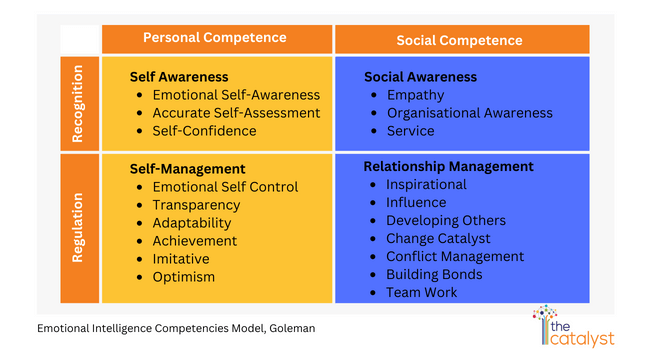Siddharth has been in the role of a sales manager for more than a year now. To reach there, he has followed every winning tactic of his sales idols. And he is teaching the same to his team. Yet he finds himself clueless, as to why the team is not able to meet the targets and generate sales as he used to.
He has tried a lot of analysis and sales models with the team, yet the team has not been able to deliver as per his expectations. Siddharth holds his head as he stares at his excel sheet and wonders what is going wrong. After all, Sales is all about numbers and a lot of selling! This is what has brought him to this new leadership role.
Quite often, high-performing sales executives get promoted to manager roles like Siddharth. And they find it difficult to replicate the success they had in their sales stint to the managerial stint. It is often attributed to one underdeveloped skill in them – emotional intelligence. Very simply put, understanding your team beyond sales numbers and excel sheets. Understanding them as human beings.
Emotional Intelligence is the ability to be aware of the emotions of oneself and those around him/her. Empathy is one of the key emotional intelligence competencies needed for Sales Leaders.
In the example given above, the sales leader is not empathetic towards his team members and is not able to understand their concerns and struggles. He is not interested in building relationships with them and only focuses on hitting targets and increasing revenue. As a result, the team members feel uninspired and unmotivated and are not able to connect with their customers effectively.
What exactly is Emotional Intelligence in Sales Leadership?
Emotional Intelligence is a power skill that allows sales leaders to be aware of their own emotions as well as others. It helps them build meaningful relationships with people – including teams, clients, customers and other stakeholders.
It makes them leaders who are approachable, empathetic and effective decision-makers at the same time.
- One study, published in the Journal of Personal Selling & Sales Management, found that sales leaders with high emotional intelligence were more likely to lead teams that achieved their sales targets.
- Another study, published in the International Journal of Sales, found that sales leaders with high emotional intelligence were better able to manage the stress and demands of the job, and were less likely to burn out.
- “Emotional Intelligence, Experience, and Education: A Study of Sales Manager Performance” (2015) by M. L. Murphy and K. M. Lapsley found that emotional intelligence is a better predictor of sales manager performance than either experience or education.
[You can read more about ongoing research on Emotional Intelligence in Organisations at EIConsortium.org]
According to Carlton Brown’s research titled “The Effect of Emotional Intelligence and Leadership Styles on Sales Performance”, there is a correlation between EI, transactional/transformational leadership styles and sales performance. And he puts it across like this –

As you can see here, leadership style and emotional intelligence are crucial components that decide the sales performance of a salesperson. And the emotional intelligence competencies for sales leaders can be grouped into 4.
4 Must Have Emotional Intelligence Attributes for a Sales Leader
Daniel Goleman in his book “The Emotionally Intelligent Workplace”, puts forth a framework of 4 clusters of emotional competencies. As per this model – sales leaders should have two sets of competencies namely, Personal Competence and Social Competence.
The personal competence set involves skills in self-awareness and self-management whereas social competence comprises social awareness and relationship management skills.
Here is how the Goleman’s EI competency model looks like-

To see which EI competencies you are doing well in and where you need development, you can take this simple EI test.
Effective Sales leaders typically demonstrate strengths in at least one competence from each of the four fundamental areas of emotional intelligence. All of these competencies can be enhanced with practice and coaching.
Developing Emotional Intelligence in Sales Leaders
With the ever-changing customer and market demands, emotional intelligence can be a decisive factor for sales leaders to navigate challenges and lead their teams to success. By investing in emotional intelligence training, sales leaders can improve their effectiveness and impact within their organizations.
- Increase Self-Awareness by listening to feedback and self-analysis using –
- Feedback from trusted sources.
- 360-degree feedback tools
- Analysing others’ responses to you in a non-work setting.
- Increase Self-Management by responding instead of reacting during times of conflict. During such situations, emotional outbursts and feelings of anger are very natural. Try to –
- Remain calm during a stressful situation
- Avoid impulsive decisions that could potentially lead to bigger issues.
- Make good decisions and let your words and actions align with those.
- Increase Social Awareness by Actively listening.
- Listen for clarity rather than just waiting for your turn to talk
- Comprehend the conversation well before you respond
- Let the listener respond appropriately.
- Increase Relationship Management by being sociable and approachable.
- Wear a smile as it makes you approachable.
- Always positively acknowledge your peers and subordinates.
- Radiate a positive presence.
Check out some of the sales leadership programs from The Catalyst for developing Emotional Intelligence.
The Catalyst as Training partner For Emotional Intelligence in Sales Leaders
The Catalyst is an experienced L&D team backed by sales experience in FMCG. We also help with detailed self-awareness and coaching using state-of-the-art psychometric tools like Lumina Spark, Lumina Sales and Lumina Leader.
Contact Us to discuss a sales leadership program best suited for your organisation.





Leave a Reply
Your email is safe with us.
You must be logged in to post a comment.